 W
WBalantiopteryx is a genus of sac-winged bats. It comprises three species:Ecuadorian sac-winged bat - B. infusca Thomas's sac-winged bat - B. io Gray sac-winged bat - B. plicata
 W
WThe shaggy bat is a bat species from South America. It appears to be a slow flier and has a rather regular pattern of foraging in its home range, a feature shared with other emballonurids. It is also aerial insectivore.
 W
WCentronycteris is a genus of sac-winged bats. It contains these species:Thomas's shaggy bat (C. centralis) Shaggy bat (C. maximiliani)
 W
WThe coastal sheath-tailed bat, or coastal tomb bat, is a species of sheath-tailed bat in the family Emballonuridae. It is found in Australia and Papua New Guinea.
 W
WColeura is a genus of sac-winged bats in the family Emballonuridae.
 W
WThe dark sheath-tailed bat is a species of sac-winged bat in the family Emballonuridae. It is the only species in the genus Mosia.
 W
WDiclidurus is a genus of bats whose common name is the ghost bats. Diclidurus all inhabit tropical South America, and D. albus is also found in Mexico and Central America. The fur of these insectivorous bats is white, sometimes with a slight greyish tinge, except D. isabella, which is partially pale brown. The only other all-white bat in the New World is the Honduran white bat, but it is easily distinguished from Diclidurus by its relatively large nose leaf. Diclidurus are poorly known and only infrequently captured, at least in part because they fly high above the ground or in the forest canopy.
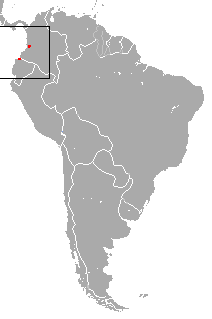 W
WThe Ecuadorian sac-winged bat is a species of sac-winged bat in the family Emballonuridae. It is found in Colombia and Ecuador. According to the IUCN Red List of Threatened Species, the population trend is decreasing for this species, due to habitat destruction through deforestation. In 2013, Bat Conservation International listed this species as one of the 35 species of its worldwide priority list of conservation.
 W
WEmballonura is a genus of sac-winged bats in the family Emballonuridae. It contains these species:Small Asian sheath-tailed bat Beccari's sheath-tailed bat Large-eared sheath-tailed bat Greater sheath-tailed bat Lesser sheath-tailed bat Raffray's sheath-tailed bat Pacific sheath-tailed bat Seri's sheath-tailed bat
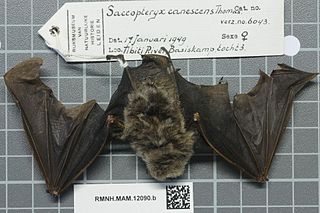 W
WThe frosted sac-winged bat is a bat species of the family Emballonuridae from South America. It is found in northern Brazil, Colombia, Ecuador, French Guiana, Guyana, Peru, Surinam, Venezuela and possibly Bolivia.
 W
WThe greater dog-like bat is a bat species from Central America and South America. It is found from southern Mexico through Brazil and Peru.
 W
WThe greater ghost bat is a bat species found in northwestern Brazil, southeastern Colombia, Guyana, Peru, and Venezuela.
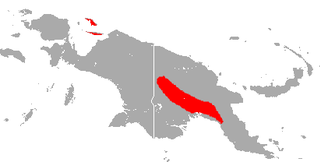 W
WThe greater sheath-tailed bat or New Guinea sheath-tailed bat is a species of sac-winged bat in the family Emballonuridae. It is endemic to New Guinea and some nearby islands. It is threatened by habitat loss.
 W
WHamilton's tomb bat is a species of sac-winged bat in the family Emballonuridae. It is found in Chad, Kenya, Somalia, South Sudan, Tanzania, and Uganda. Its natural habitats are dry savanna and moist savanna. It is threatened by habitat loss.
 W
WThe Indonesian tomb bat is a species of sac-winged bat in the family Emballonuridae. It is found only in Indonesia.
 W
WIsabelle's ghost bat is a bat species found in northwestern Brazil, Guyana, and Venezuela, and possibly Colombia. It was discovered in October 1916 by Emilie Snethlage, and described by Oldfield Thomas in 1920. While the species name is suggestive that he named it after someone, his notes did not say this as they usually did when he named a species after someone. It has been suggested that the species name is in reference to the color isabelline, which describes the color of this species. In that case, the common name should instead be the isabelline ghost bat. They are pale brown in color, with the head and shoulders appearing whitish. Their forearms are approximately 54 mm (2.1 in) long.
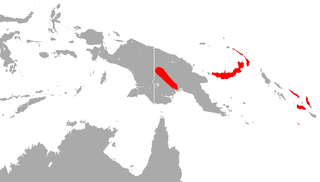 W
WThe large-eared sheath-tailed bat is a species of sac-winged bat in the family Emballonuridae. It is found in Papua New Guinea and Solomon Islands. It is threatened by habitat loss.
 W
WThe lesser sheath-tailed bat is a species of sac-winged bat in the family Emballonuridae. It is found in the Malay Peninsula, Borneo, and many other parts of the Indonesian Archipelago. It is locally threatened by habitat loss.
 W
WThe long-winged tomb bat is a species of sac-winged bat in the family Emballonuridae.
 W
WThe Pacific sheath-tailed bat or Polynesian sheath-tailed bat is a species of sac-winged bat in the family Emballonuridae found in American Samoa, Fiji, Guam, Micronesia, Palau, Samoa, Tonga, and Vanuatu. Its natural habitat is caves. In 2013, Bat Conservation International listed this species as one of the 35 species of its worldwide priority list of conservation. It is threatened by habitat loss. There are estimated to be approximately 500 individuals of E. s. rotensis, a subspecies of the highly fragmented Emballonura semicaudata. Due to its dependence on forests and caves for roosting, it is known to roost in only three caves currently, E. s. rotensis is vulnerable to changes in the surrounding demographic and environmental changes reflective of indirect impacts caused by invasive species, in this case goats. Goats limit the carrying capacity of E.s. rotensis.
 W
WPel's pouched bat is a species of sac-winged bat in the family Emballonuridae. It is found in Angola, Cameroon, Republic of the Congo, Democratic Republic of the Congo, Ivory Coast, Equatorial Guinea, Gabon, Ghana, Guinea, Kenya, Liberia, Nigeria, and Uganda. Its natural habitats are subtropical or tropical dry forests and subtropical or tropical moist lowland forests. It is threatened by habitat loss.
 W
WPeters's sheath-tailed bat is a species of sac-winged bat in the family Emballonuridae. It is found only in Madagascar. It is threatened by habitat loss.
 W
WRaffray's sheath-tailed bat is a species of sac-winged bat in the family Emballonuridae. It is found in eastern Indonesia, Papua New Guinea, and Solomon Islands.
 W
WSaccopteryx is a genus of sac-winged bats from Central and South America. The species within this genus are:Antioquian sac-winged bat Saccopteryx antioquensis Greater sac-winged bat Saccopteryx bilineata Frosted sac-winged bat Saccopteryx canescens Amazonian sac-winged bat Saccopteryx gymnura Lesser sac-winged bat Saccopteryx leptura
 W
WSeri's sheath-tailed bat is a species of sac-winged bat in the family Emballonuridae. It is found in the Bismarck Archipelago and Yapen Island (Indonesia). Its natural habitat is caves.
 W
WThe small Asian sheath-tailed bat is a species of sac-winged bat in the family Emballonuridae. It is found in Borneo, Sulawesi, and the Philippines.
 W
WTaphozous is a genus of the family Emballonuridae. The wide distribution of the genus includes several regions of Australia, Indonesia, Papua New Guinea and Africa.
 W
WTheobald's tomb bat is a species of sac-winged bat in the family Emballonuridae. It is found in India, Indonesia, Myanmar, Thailand, and Vietnam.
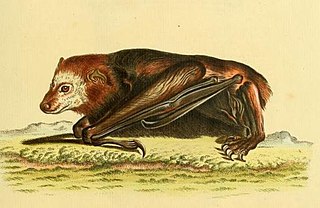 W
WThe Trinidad dog-like bat is a species of bat from the family Emballonuridae. It is native to Aruba, French Guinea, Grenada, Trinidad and Tobago, and Venezuela. The bat is considered to be rare everywhere in its geographic range, although this may be untrue, as the Trinidad dog-like bat was previously confused with the lesser dog-like bat. It is an aerial insectivore that roosts in hollow trees, hollow rotten logs on the ground, under overhanging banks, and caves in the Llanos of Venezuela.
 W
WTroughton's sheath-tailed bat is a species of sheathtail bat in the family Emballonuridae, found only in Australia.
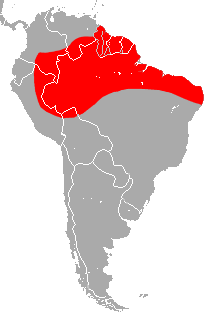 W
WThe white-winged dog-like bat is a bat species from South America. It is found in northern Brazil, southeastern Colombia, Ecuador, French Guiana, Guyana, eastern Peru, Surinam and Venezuela.